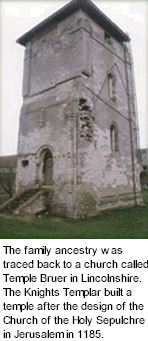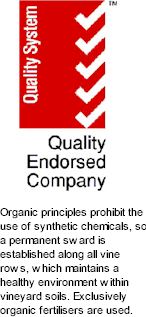


David and Barbara Bruer established a small vineyard in the early 1970s at a property situated on the main road between the towns of Strathalbyn and Milang, in the grapegrowing district of Langhorne Creek. David was in charge of Roseworthy College's Oenology Department before becoming a full-time vigneron, while Barbara also taught chemistry at Roseworthy College and Flinders University for ten years. Fruit was initially sold to other appreciative winemakers. Gradually increasing quantities of wine came to be vinified on the property under the Temple Bruer label since the late 1970s. David and Barbara also established a vine nursery, using the property’s fertile soil to produce rootlings for sale to other growers.

Today David Bruer oversees a growing business and a dedicated team who possess a great knowledge and enthusiasm for all fields of Temple Bruer and the organic wine industry. The wines are distributed across Australia by Angoves. The Temple Bruer range includes award winning editions produced in accordance to Temple Bruers strict organic philosophy. It is this philosophy which has led to their being accredited with ISO9001 status. The philosophy is to make the best wines from the fruit vintaged, to present the wines well, and to make them affordable. If the team are dissatisfied with any wine vintaged, it is sold in bulk. This ensures that only wines of the best quality are sold under the Temple Bruer label.
Langhorne Creek is bordered on the north by the Mt Lofty Ranges, and on the south by the huge fresh water Lake Alexandrina. The Bremer and Angas Rivers pass through the area which is prone to flooding in years with high rainfall. Temple Bruer's vineyards are irrigated in the winter by controlled flooding from the rivers. Drip irrigation is commonly used in summer to supplement the winter floods, with water supplied either by underground bores or pumped from the nearby lake.
Temple Bruer has long held to the philosophy that responsible farmers (of which winegrowers are merely one example) should aim to minimise chemical inputs into the environment. This philosophy was put into practice in the early 1990s, when conversion to fully certified organic grapegrowing practices commenced. Today, all plantings are certified as A-Grade Organic by the Australian Certified Organics (ACO).

Plantings in the older portions of the Temple Bruer Vineyard developed over a period of nine years. Newer plantings commenced in 1994 on an adjoining block. By the year 2004 it was obvious that the commercial value of the original plantings were becoming limited as the yields were decreasing anually and the quality of the fruit was also reducing. Temple Bruer now only crops the newer vineyard consisting of 16 hectares planted to Cabernet Sauvignon, Shiraz, Malbec, Merlot, Cabernet Franc and Petit Verdot fruit along with some Grenache and also white varieties including Verdelho, Chenin Blanc, Viognier and Riesling.
Temple Bruer are proudly certified as a Quality Endorsed Company complying to the requirements of the ISO 9001:2000 standard for Quality Management Systems (AS/NZS ISO 9002:2000, Lic.13266) and HACCP food safety managment (Lic. HCV00538). This is an internationally recognised system of standards to which a company can strive to achieve sound management practices in order to consistently meet customer requirements, while leading to continued improvement in business. Importantly it provides for continued review of company protocols, staff and customer feedback, and control of planning and development within the company through the use of a documented quality system that is well implemented and consistently followed. Temple Bruer is currently recommended to the 2000 set of standards for ISO 9001. Temple Bruer is believed to represent the first combined small vineyard, winery and nursery operation in Australia to achieve recommendation to the ISO 9001 system of standards.
The registration covers the quality management system for the growing, harvesting and production of organic wines for local and export markets; and for the collection, treatment and propagation of viticultural nursery stock. The estate proudly displays the quality system trademark logo of the certification company SAI-Global Assurance Services to promote achievement as a Quality Endorsed Company.
All new plantings are established to a trellis system which is efficient in maximising the interception of sunlight. Organic grapegrowing principles prohibit the use of synthetic chemicals so a permanent sward is established along all vine rows, which maintains a healthy environment within vineyard soils. Only organic fertilisers are used. Temple Bruer prepares its own compost (about 100 tonnes per year) which is made from grape seeds and skins, grass, hay and yeast lees from the fermentations. Wood shavings from barrel recycling are added. Ocassionally other sources of plant material are included, such as mulched tree loppings from power line clearance as supplied by local contractors.
